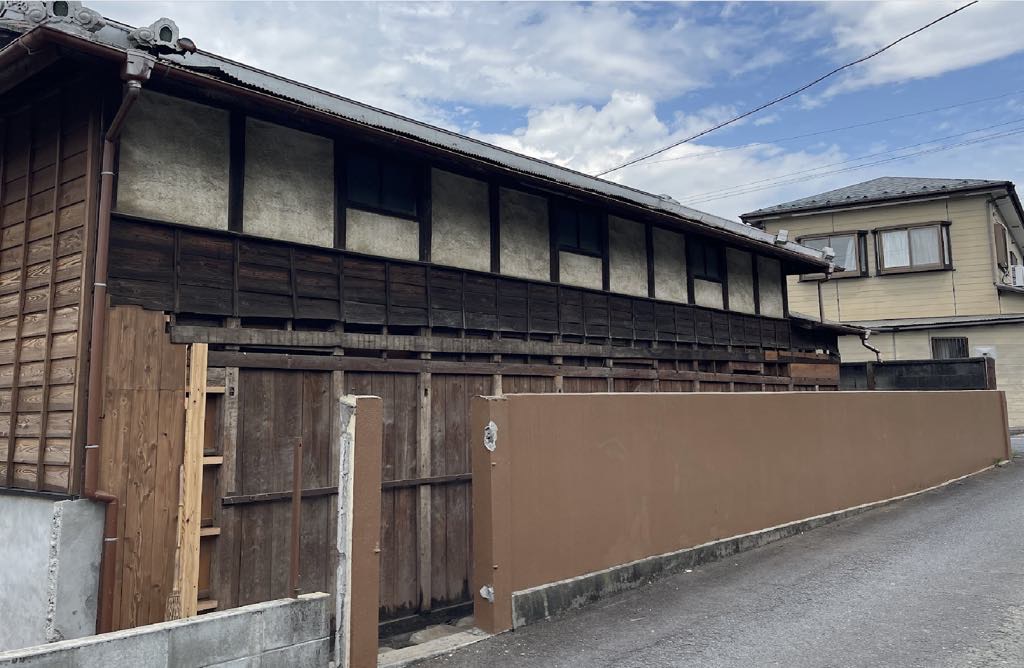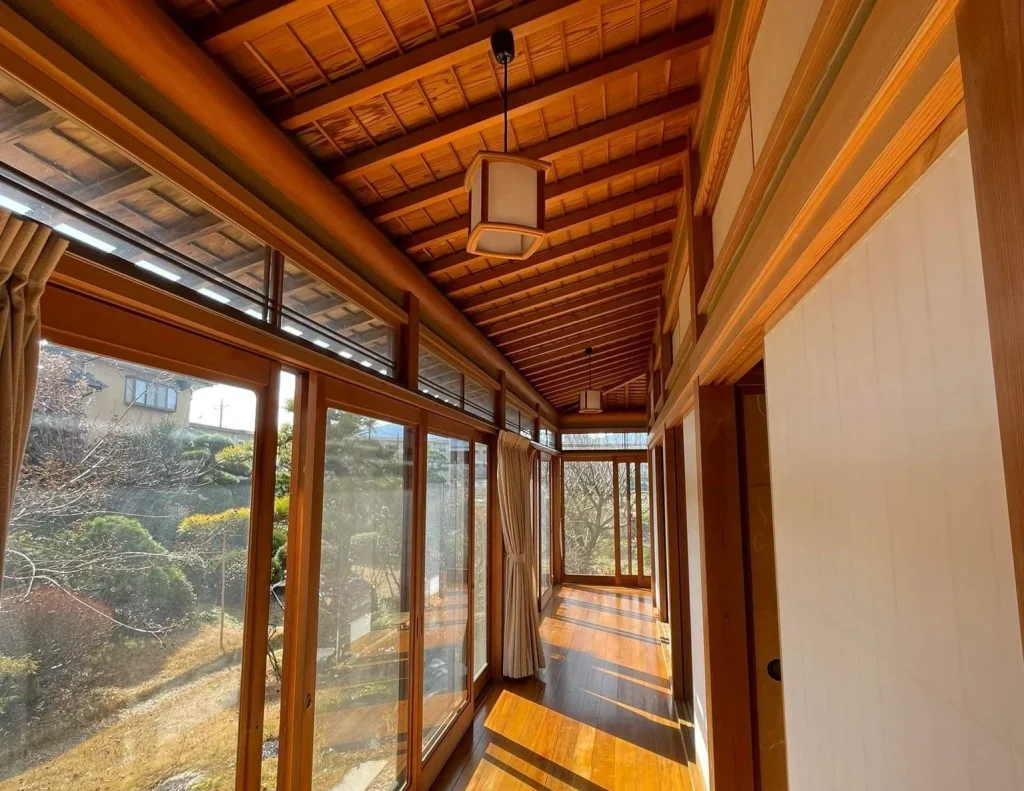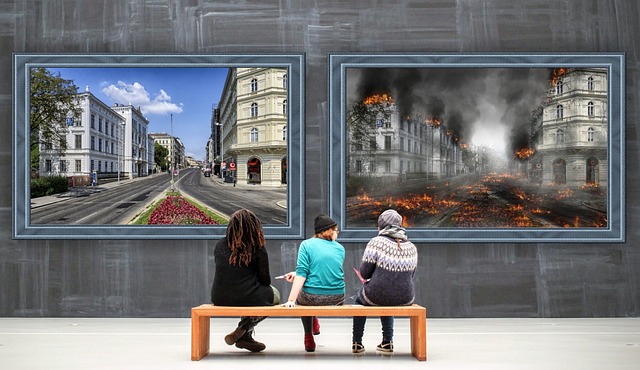
Recently, I have been unable to control my anger,
Despite everything, my husband decided that we should get a completion inspection for our traditional Japanese house, which was built about 30 years ago, and obtain a completion certificate. At the time, it was common not to have a completion inspection even after construction was finished, so our building doesn’t have one.
If a building lacks this certificate, it must undergo renovations to comply with the current Building Standards Act, after which an inspection by a specialized agency is required to issue the certificate.
The reason this is necessary is that the certificate is needed when renovating the building, obtaining permits for use as lodging, and it also makes it easier to sell the property. Although our recent purchase didn’t require it, having the certificate would make future sales smoother.
So, the construction began.

The middle roof was demolished, followed by the removal of the low wall. The wall was protruding about 10 centimeters into the road, which made it illegal construction, necessitating its removal. This low wall was supporting a part of the warehouse roof, so it had to be demolished.
And, as expected, what I feared happened. During the demolition of the wall, the roof also got demolished. The wall of the warehouse that the roof was attached to peeled off together. “Why couldn’t you have demolished it more carefully?” I was furious. To make matters worse, temporary wood was hastily patched onto the damaged area without my consent, turning it into a dreadful sight.
And there was another issue.
There were dark stains on the roof above the veranda of the main house, indicating water infiltration.
Above the roof of this veranda is the second-floor balcony. It was suggested that rainwater might be seeping in from the balcony, and since waterproofing work is necessary about once every ten years, waterproofing was recommended.
The balcony floor was removed and disposed of, but even after hosing it down, it didn’t seem to be the cause.
So, they speculated that rainwater might be blown in through gaps by strong winds, and they used a high-pressure washer to spray water.
As a result, water infiltration was confirmed. However, the roof of the veranda turned even more extensively blackened, watermarks spread to the shoji screens inside the house, and surrounding wooden parts showed watermarks, which also stained parts of the floor.
“We’ve identified the cause. It’s water infiltration from under the eaves.”

A traditional Japanese house: The veranda roof before hosing down. In the process of identifying the cause, the building suffered significant damage, and we incurred several hundred thousand yen in expenses.
If I had been in Japan, this would never have happened. My husband assured me to leave it to him, but this is the result of doing so. I was furious and at a loss as to whom to direct my anger (naturally, we had a huge fight. In my rage, I even mistakenly sent a message to another person saying I couldn’t stand it anymore and wanted a divorce.)
I have been unable to control my anger, overwhelmed by one trouble after another, leaving me mentally exhausted.
My husband doesn’t recognize these as troubles, so I’m the only one getting angry, and he believes without a doubt that I caused inconvenience by interfering with the construction workers. I really don’t understand.
From the middle of the process, I was pleading to have a specialist take a look, but my pleas were ignored, leading to this outcome.
By “specialist,” I mean an expert in traditional Japanese architecture. The balcony being integrated with the roof is likely a unique feature of traditional Japanese structures. Additionally, the water infiltration from under the eaves is also specific to traditional Japanese buildings.
It’s too late, but my husband finally called a specialist in traditional Japanese architecture.
“We shouldn’t do anything. Wood is alive and breathes, so sealing off water infiltration would only cause the wood to rot.”
That’s what the specialist said.

I am deeply grateful for the advice to “do nothing.”
There are many things in the world that get ruined by unnecessary actions.
Even with health, aren’t many problems caused by unnecessary actions? We consume unnatural, unnecessary things, continue to take ineffective treatments, and when we don’t get better, we continue to do more unnecessary things. This can even lead to death.
When it comes to soil, we add all sorts of unnecessary things, continue to put in nutrients and pesticide by human minds, and what is the result?
There are many necessary actions, but humans are eager to do unnecessary things. Often, without even realizing it, we do these things believing they are good.
The environment too, must be suffering from continuous unnecessary actions, leading to its destruction.
One reason I don’t want to return to my profession as a dentist is that I realized there are many unnecessary things.
There are many necessary actions in dentistry, but once a tooth is drilled, it can never be restored. The more treatments are done, the further it moves from health, and when I realized this, I felt a contradiction within myself and became disillusioned.
Please don’t misunderstand; there are many necessary treatments in dentistry. But there are also many unnecessary actions.
From this experience, I learned that there are many things that only a specialist can judge. Even within the same field of construction, it varies. Without experience in that specific area, you can’t understand.
Moreover, because work involves money, the more unnecessary things you do, the more money is involved. No one stops the unnecessary actions if they are believed to be beneficial and generate money, turn the economy, and keep jobs going.
By the time you realize something was unnecessary, it’s already too late.
To distinguish between necessary and unnecessary actions requires a lot of life experience. And having the courage to stop unnecessary actions when you recognize them is even more difficult.
When both judgment and courage to recognize and stop unnecessary actions are achieved, I believe the world will change significantly.